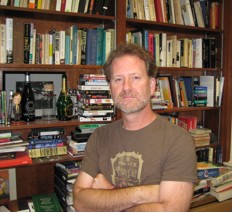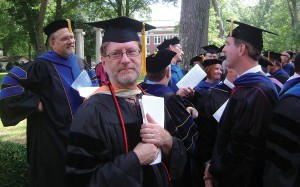Dr. Terry Barr Publishes essay “Neither the Season, Nor the Time”
 It is often said that truth is stranger than fiction. Few recognize this fact better than Dr. Terry Barr, an English professor who has taught at Presbyterian College for nearly 30 years. Dr. Barr’s essay “Neither the Season, Nor the Time” which was published in the Belle Reve Literay Journal, explores the topics of irony, tragedy, and the odd twists of fate which continue to confound and fascinate readers despite the considerable passage of time.
It is often said that truth is stranger than fiction. Few recognize this fact better than Dr. Terry Barr, an English professor who has taught at Presbyterian College for nearly 30 years. Dr. Barr’s essay “Neither the Season, Nor the Time” which was published in the Belle Reve Literay Journal, explores the topics of irony, tragedy, and the odd twists of fate which continue to confound and fascinate readers despite the considerable passage of time.
Though this first person account covers many themes Dr. Barr stresses that “It’s really about him (Buford) and about the ironies about that black/white community.” About these small communities he admitted that “There were just some things you never knew.”
On his faculty page on the PC website Barr notes that “My teaching philosophy is, and has always been, to persuade and give opportunities to students to see their world from as many perspectives as possible.” He certainly does that in his essay where he cleverly invokes the past and challenges himself and readers to examine this event by a new light. Skillfully weaving his own account with those of relatives and friends, Dr. Barr crafted a poignant portrayal of life in the south and the rich history that hides in its corners.
 The story takes place in the author’s home town of Bessemer, Alabama, and is inspired by the hero and victim, Buford White. He lived in a time of social unrest during the integration era of the 1960’s. Barr shares insights from his past about growing up in time that was underscored by both volatile change and uncertain hope. The most amazing aspect of this story is its enduring relevance in today’s world. Racial discrimination is unfortunately still a major issue in our nation and something that is ignored until tragedy brings it to the forefront. One could argue that the reason stories like Buford’s are so widely successful is because they resonate so clearly with the modern reader. With his powerful retelling, Dr. Barr not only sheds light on the injustice and hypocrisy of the time but also highlights the elegance of non-fiction writing. Many readers are so much more accustomed to fictional realms and fantasies that they might overlook the more potent magic of everyday experiences. “Neither the Season, Nor the Time” is a story etched with sadness, lush with nostalgic descriptions, and firmly stitched together with the gleaming threads of truth. It is a story driven by the author’s desire to hold on to his childhood memories. Barr’s piece reminds us that writing is a form of immortality that seals memories, placing these ephemeral treasures just out of reach of Time’s greedy grasp.
The story takes place in the author’s home town of Bessemer, Alabama, and is inspired by the hero and victim, Buford White. He lived in a time of social unrest during the integration era of the 1960’s. Barr shares insights from his past about growing up in time that was underscored by both volatile change and uncertain hope. The most amazing aspect of this story is its enduring relevance in today’s world. Racial discrimination is unfortunately still a major issue in our nation and something that is ignored until tragedy brings it to the forefront. One could argue that the reason stories like Buford’s are so widely successful is because they resonate so clearly with the modern reader. With his powerful retelling, Dr. Barr not only sheds light on the injustice and hypocrisy of the time but also highlights the elegance of non-fiction writing. Many readers are so much more accustomed to fictional realms and fantasies that they might overlook the more potent magic of everyday experiences. “Neither the Season, Nor the Time” is a story etched with sadness, lush with nostalgic descriptions, and firmly stitched together with the gleaming threads of truth. It is a story driven by the author’s desire to hold on to his childhood memories. Barr’s piece reminds us that writing is a form of immortality that seals memories, placing these ephemeral treasures just out of reach of Time’s greedy grasp.
 Readers will no doubt note the sharp divide between the blatant racism of the day and the apparent affection that the white community held toward Buford. Despite the deeply ingrained negativity towards African Americans of the time, the violent death of this kind and beloved black man shook a southern community to its core. It’s curious how people can turn a blind eye to the ugly parts of society that they would rather not acknowledge. But as Barr writes in his essay, “even a blind eye bleeds.”
Readers will no doubt note the sharp divide between the blatant racism of the day and the apparent affection that the white community held toward Buford. Despite the deeply ingrained negativity towards African Americans of the time, the violent death of this kind and beloved black man shook a southern community to its core. It’s curious how people can turn a blind eye to the ugly parts of society that they would rather not acknowledge. But as Barr writes in his essay, “even a blind eye bleeds.”
While Dr. Barr is proud of his work and hopes that his memories of life in Bessemer might yield a book someday, he says that “It’s more satisfying to know that I have these stories and can account for them.”
